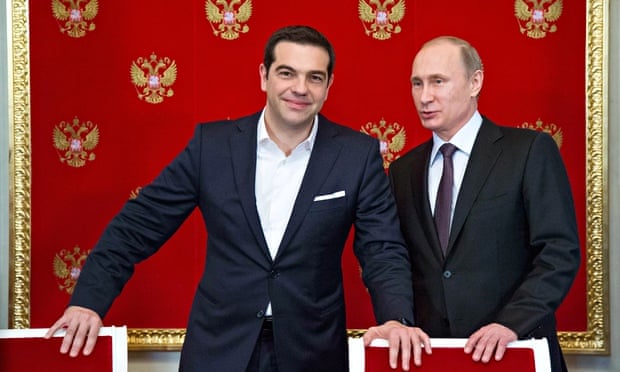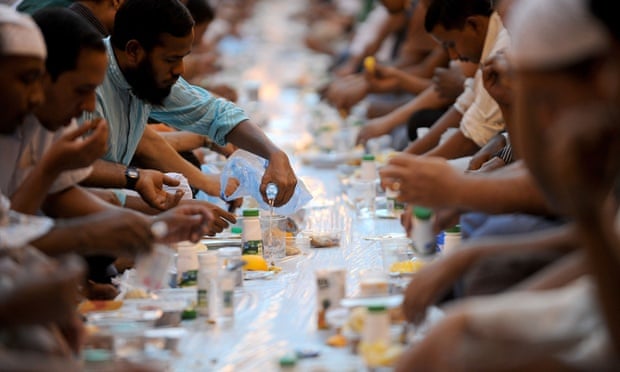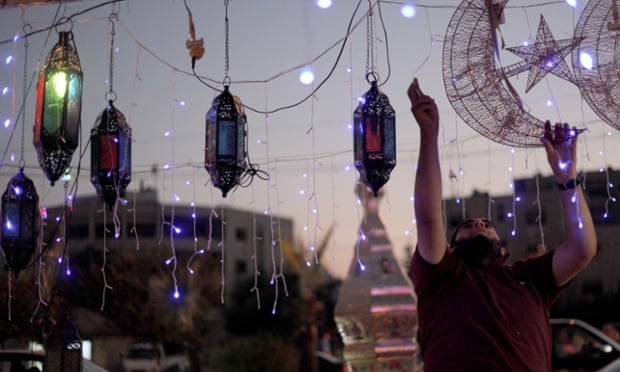Larry Elliott Economics editor Monday 29 June 2015
Any government that runs into difficulties in the future will have the Greek option of devaluation as an alternative to endless austerity
Franz Ferdinand Archduke of Austria and his wife Sophie, Duchess of Hohenberg moments before they were assassinated in Sarajevo on 28 June 1914. Photograph: Design Pics Inc/Rex/Design Pics Inc/Rex
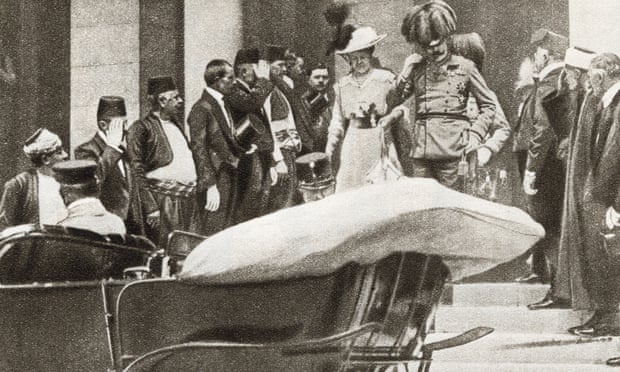
A hundred and one years ago on Sunday, gun shots rang out in a city in southern Europe. Few at the time paid much heed to the assassination of Archduke Franz Ferdinand and his wife as they drove through the streets of Sarajevo. Within six weeks, however, Europe was at war.
Make no mistake, the decision by Alexis Tsipras to hold a referendum on the bailout terms being demanded of his country has the potential to be a Sarajevo moment. The crisis is not just about whether there is soon to be a bank run in Greece, although there is certainly the threat of one. It is not just about whether the creditors overplayed their hand in the negotiations, although they did. It is about the future of the euro itself.

Greek banks to stay closed on Monday
A meeting of the Greek financial stability council makes decision on day ECB freezes its funding for the banking sector
There will be much talk in the next few days about how Greece can be quarantined. The three people who have been leading the negotiations for the troika - Christine Lagarde of the International Monetary Fund, Jean-Claude Juncker of the European commission and Mario Draghi of the European Central Bank - can still cling to the hope that Tsipras will lose the referendum next Sunday.
In those circumstances, the Syriza-led coalition would have little choice but to hold an election. The return of a government headed by, for example, the centre-right New Democracy, would open up the possibility that Athens would sue for peace on the terms demanded by the troika.
There is, however, no guarantee of this. The troika was certain last week that Tsipras would fold when presented with a final take-it-or-leave-it offer. They were wrong. The Fund, the ECB and the European commission made a fatal misjudgement and have now lost control of events.
The immediate decision for the ECB was whether to cut off emergency funding before the country’s bailout programme formally ends on Tuesday. Wisely, it has chosen not to make matters worse.
In recent weeks, the Greek banks have only been able to stay open because Draghi has provided funds to compensate for capital flight. Sunday night’s announcement of an emergency bank holiday and capital controls demonstrates just how critical the situation has become.
Germany strongly supports the immediate end to emergency liquidity assistance (ELA), arguing that taxpayers in the rest of Europe should not be further exposed to the risk of a Greek exit from the single currency. The ECB, however, has always been reluctant to take what would clearly be a political decision to escalate the pressure on the Greek banks, and has announced that it will continue providing funding at last week’s level.

Greece crisis: a disaster for Athens and a colossal failure for the EU
After three crises in as many days, the collective performance of the Eurozone's governments inspires little hope or confidence in their crisis management
Even so, Greece now faces a week of turmoil. Tsipras bowed what seemed to be inevitable on Sunday by announcing controls to try to prevent Northern Rock-style queues outside the banks and - just as importantly - money leaving the country.
The Greek government will also be making contingency plans for exit from the single currency. Tsipras and Yannis Varoufakis, his finance minister, say that is not their wish or intention, but if the result of the referendum backs the government’s stance it is hard to see any alternative. Cyprus stayed in the euro after introducing capital controls, but it was done with the approval of other single currency members and involved knuckling down under an austerity programme.
In the meantime, the blame game has begun. The creditors say they offered Greece a deal that would have secured future financing in return for reforms and budget savings which would have hastened the country’s economic recovery. Lagarde has said there is now nothing on the table and that Greece should not expect the same terms to be available after the referendum.
Tsipras said the troika was proposing an “extortionate ultimatum” of “strict and humiliating austerity without end”. A spokesman for Varoufakis said the referendum meant the end to five years of “waterboarding”.
The stance taken by the troika has been wrong-headed but inevitable. Greece has seen its economy shrink by 25% in the past five years. A quarter of its population is unemployed. It has suffered a slump of Great Depression proportions, yet the troika has been demanding fresh tax increases that will suck demand from the economy, stifle growth and add to Greece’s debt burden.
If Greece were outside the euro, IMF advice would be different. The fund would be telling Greece to devalue its currency. It would be telling the country’s creditors that they would have to take a “haircut” in order to make Greece’s debts sustainable. It would then justify domestic austerity on the grounds that the benefits of the devaluation should not be frittered away in higher inflation.

The Greeks for whom all the talk means nothing – because they have nothing
For Georgios Karvouniaris, his sister Barbara, and many thousands like them, whether Greece stays in the Eurozone or not is unlikely to have any effect
This option, though, has not been made available to Greece. It is unable to devalue and European governments are resistant to the idea of a debt write-down. So the only way Greece can make itself more competitive is to cut costs, by reducing wages and pensions.
A fully fledged monetary union has the means to transfer resources from one region to another. This is what happens in the US or the UK, for example, with higher taxes in areas that are doing well being redistributed to areas with slower growth and higher unemployment.
The euro, however, was constructed along different lines. Countries were allowed to join even though it was clear they would struggle to compete with the better performing nations such as Germany. A stability and growth pact designed to ensure a common set of budget controls was a poor substitute for fiscal union. From the start, it was obvious that the only mechanism for a country that ran into severe difficulties would be harsh austerity. Greece is the result of what happens when politics is allowed to override economics.
If Greece leaves, the idea that the euro is irrevocable is broken. Any government that runs into difficulties in the future will have the Greek option of devaluation as an alternative to endless austerity. Just as importantly, the financial markets will know that, and will pile pressure on countries that look vulnerable. That’s why Greece represents an existential crisis for the Eurozone.
It will be said in response that Greece is a small, insignificant country and that the single currency has much better defences than it had at the last moment of acute trouble in the summer of 2012. Diplomats in Europe’s capitals took very much the same view in late June 1914.
Greece crisis could be a Sarajevo moment for the Eurozone | Business | The Guardian


 Rob Henderson in his cab (Laurent Villeret/The Telegraph)
Rob Henderson in his cab (Laurent Villeret/The Telegraph)  Migrants sit and wait near Mr Henderson's lorry (bottom left)
Migrants sit and wait near Mr Henderson's lorry (bottom left)  A man attempts to open the back doors of a lorry (Laurent Villeret/The Telegraph)
A man attempts to open the back doors of a lorry (Laurent Villeret/The Telegraph)  Climbing over boxes in the back of a lorry (Laurent Villeret/The Telegraph)
Climbing over boxes in the back of a lorry (Laurent Villeret/The Telegraph) 

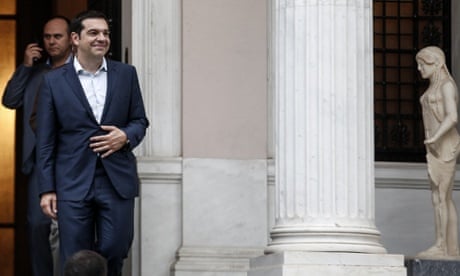



 David Cameron is due to meet with European leaders at a summit in Brussels this week
David Cameron is due to meet with European leaders at a summit in Brussels this week  A look at how much Britain contributes to the EU
A look at how much Britain contributes to the EU 

 Photo: Thousands gathered to protest against UK PM David Cameron's proposed austerity measures. (Reuters: Peter Nicholls)
Photo: Thousands gathered to protest against UK PM David Cameron's proposed austerity measures. (Reuters: Peter Nicholls) 

